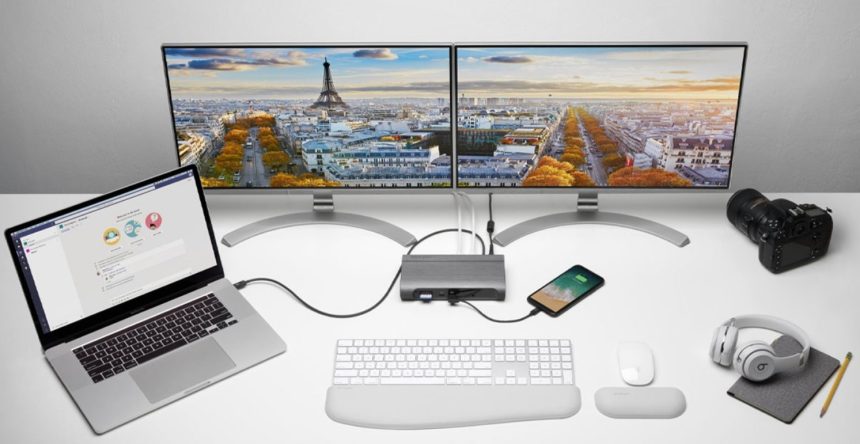Docking stations for laptops are designed to bridge the gap between portability and having a stationary place to work and play. They allow you to set up a laptop in a desktop configuration (keyboard, monitors, mouse, wired Ethernet, audio, power, etc.). Yet, you will be able to easily disconnect your laptop for portable use.
The best laptop docking stations have the potential to turn your laptop into a portable powerhouse. With it, you can easily attach your system to several monitors and various peripherals with extra USB ports.
When choosing a docking station, it is worth noting that not every model is built the same or packs the same set of features and available ports. So, when you shop, make sure you have reviewed all the details and confirm that your entire requirement is met.
To choose the right product, take a look at some factors when buying a computer docking station.
Available Ports
The main purpose of a port replicator (docking station) is to connect more devices to your docking station. So, a wide range of ports should be available in the docking stations that you want to buy. The best is one that has a minimum of 17 ports, like the Baseus 17-in-1 USB C Docking Station.
The most common ports are:
- USB-C (with or without Power Delivery support)
- USB Type-A, Gigabit Ethernet
- 3.5mm headphone jack
- Thunderbolt 3 or 4
- DisplayPort
- HDMI 2.0 or 3.0.
- An SD and microSD Card reader are also available
Compatibility
When choosing a docking station, make sure whether or not it is compatible with your devices. For this purpose, go for a universal docking station as it does not have limitations regarding compatibility. By using this device, you won’t need to worry about whether the device will work with your specific system or not.
Universal docking stations are the right option for those who use multiple devices from different brands. For instance, organizations have hundreds and thousands of employees who have different brands of laptops. In such a case, choosing a universal docking station can serve the purpose.
Portability
There are two factors to consider – stationary and portable. The difference between the two is that stationary docking stations are packed with their power supply. They do not need power from the laptop to connect to peripherals. They can supply power to both your laptop and peripheral devices.
On the other hand, portable docking stations do not have a power supply feature. They require power from your laptop that is used to power your connected peripherals.
Stationary docking stations are more powerful and thus provide more ports to connect your peripherals. However, depending on your needs, you can choose either of the two. Choose a stationary docking station for your work-from-home setup and a portable one that you carry by your side when you’re working on the go.
Audio Output
Before picking a docking station for a laptop, ask yourself whether it will support your speakers. Pay attention to the audio outputs in addition to the video output.
If audio quality is important (for example, if you conduct webinars, work in broadcast media, or as a podcaster), it is advisable to choose a docking station that supports dedicated external speakers with a 3.5 jack for plugging in a microphone.
Design
Docking systems have two main types of designs: vertical and horizontal. The horizontal design is the preferable choice for most people because of space reasons and how they often fit any workstation.
However, if you want to choose something that does not take up a large footprint on your worktable, then buy a vertical docking station. Please note that the design of the docking station totally depends on how your work environment is and which of the two designs will be best suited to your requirements.
Size
Size is another factor to take into account when choosing a docking station. If you are working from home, then opt for a smaller device because it will have a few devices to connect with. But, small-sized docking stations might not be a good choice for large offices, especially when users have to use multiple devices.
Pick the Right Docking Station for Your Laptop
Laptops docking stations are handy for a number of good reasons. They have the ability to expand the number of ports to connect peripherals to your laptop. Choosing the right docking station requires you to check available ports, laptop model, compatibility, portability, audio-video output, power output, size, design and much more.
Lenovo provides custom docks for Lenovo ThinkPad and laptops. It also offers universal docking station models that will allow you to connect it to all your accessories with almost any brand of the laptop with the help of a modern USB C docking station, or Thunderbolt 3 docking station.














